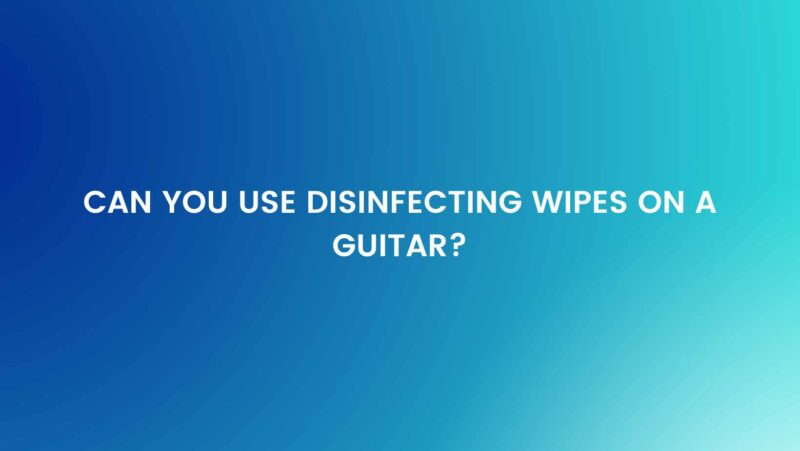Guitars are not just musical instruments; they are treasured possessions for many musicians. Maintaining your guitar’s cleanliness is crucial for preserving its appearance, playability, and overall quality. In light of recent health concerns, some guitarists wonder if disinfecting wipes are a safe and effective way to clean their instruments. This article will explore whether disinfecting wipes can be used on guitars, their potential benefits, and the precautions you should take when considering this cleaning method.
Understanding Guitar Materials
Before using disinfecting wipes on your guitar, it’s essential to understand the materials commonly used in guitar construction. Guitars are composed of various components, each with its unique characteristics and susceptibilities to cleaning agents:
- Wood: Guitars often have wooden bodies, necks, and fretboards. Wood is sensitive to moisture and chemicals. Excessive use of disinfecting wipes can lead to issues like drying out the wood, which may result in cracks or other structural problems.
- Metal: Many guitars, especially electric guitars, contain metal components such as frets, tuning pegs, and bridges. While metal is generally less affected by disinfecting wipes, it’s crucial to prevent prolonged exposure, which could lead to discoloration or corrosion.
- Plastic and Electronics: Guitars may feature plastic parts like pickguards, control knobs, and electronic components. Some disinfecting wipes may contain harsh chemicals that can damage or degrade certain types of plastics and harm electronic circuits.
Effects of Disinfecting Wipes on Guitars
The use of disinfecting wipes on guitars can have both positive and negative effects, depending on how and where they are applied:
Positive Effects:
- Cleaning: Disinfecting wipes can effectively remove fingerprints, dirt, grime, and sweat from the guitar’s surface, helping to maintain its appearance.
- Disinfection: In situations where hygiene is a concern, such as sharing your guitar with others or playing in public spaces, disinfecting wipes can help reduce the spread of germs.
Negative Effects:
- Finish Damage: Disinfecting wipes may strip away protective finishes, potentially leaving a dull or hazy appearance, especially on glossy finishes.
- Wood Drying: Overuse of disinfecting wipes on wooden parts can lead to the wood drying out, potentially causing cracks or other structural issues.
- Electronics and Plastics: Some disinfecting wipes may contain harsh chemicals that can damage or deteriorate certain types of plastics and electronic components if not used with care.
Safe Cleaning and Maintenance
To ensure the safe and effective cleaning of your guitar, follow these recommended cleaning and maintenance practices:
- Use a Soft Cloth: For routine cleaning, start with a soft, lint-free cloth to gently wipe away surface dust, fingerprints, and smudges. Avoid abrasive materials or paper towels that could scratch the finish.
- Specialized Guitar Cleaners: Consider using specialized guitar cleaning products formulated to clean and protect guitar finishes without harming wood or other components.
- Minimal Use of Disinfecting Wipes: If you choose to use disinfecting wipes, do so sparingly and primarily for non-wooden parts like metal hardware. Apply a small amount of the disinfectant to the cloth, not directly to the guitar.
- Avoid Electronics: When using disinfecting wipes, be cautious around electronic components and plastic parts. Minimize direct contact with these areas to prevent potential damage.
- Test in a Hidden Area: If you’re uncertain about the compatibility of disinfecting wipes with your guitar’s materials, conduct a test in an inconspicuous area first.
Conclusion
In conclusion, the use of disinfecting wipes on guitars can be suitable for specific cleaning tasks, particularly when hygiene is a concern. However, it must be approached with caution, especially when dealing with wooden components and sensitive materials. Generally, it is safer to use specialized guitar cleaning products designed to clean and protect your instrument without causing harm. By adopting safe cleaning practices and being mindful of your guitar’s materials, you can ensure that your instrument remains in top condition, both in terms of appearance and performance, for years to come.


